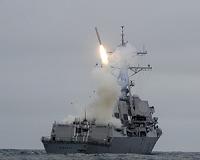 |
Washington (AFP) March 19, 2011 The United States on Saturday unleashed a barrage of Tomahawk missiles against the Libyan regime's air defenses, but ruled out using ground troops in what President Barack Obama called a "limited military action." After initially taking a cautious stance on armed intervention in Libya's civil war, Obama ordered the strikes citing the threat posed to civilians by Moamer Kadhafi's forces and a UN-mandated no-fly zone endorsed by Arab countries. "We must be clear: actions have consequences, and the writ of the international community must be enforced," Obama told reporters while on an official visit to Brazil. "We are answering the calls of a threatened people. And we are acting in the interests of the United States and the world," he said, stressing that Washington was acting in concert "with a broad coalition." But with nearly 100,000 US troops fighting a protracted war in Afghanistan -- and with Saturday's missile strikes coming eight years to the day after the United States launched its war in Iraq -- Obama made clear that operation "Odyssey Dawn" would not send US troops to Libya. "As I said yesterday, we will not -- I repeat -- we will not deploy any US troops on the ground," he said. In a dramatic show of force, US warships and a British submarine fired at least 110 Tomahawk cruise missiles into Libya against Kadhafi's anti-aircraft missiles and radar, the US military said. Admiral William Gortney told reporters at the Pentagon that the cruise missiles "struck more than 20 integrated air defense systems and other air defense facilities ashore." The first missile struck at 1900 GMT following air strikes carried out earlier by French warplanes, said Gortney, director of the US joint staff. "It's a first phase of a multi-phase operation" to enforce the UN resolution and prevent the Libyan regime from using force "against its own people," he said. The missile strikes came despite skepticism in the US military over the risks of intervention, with Defense Secretary Robert Gates repeatedly expressing caution even as he promised to provide Obama with a full menu of military options. Gates, who postponed a planned trip to Russia on Saturday for at least 24 hours, had suggested that Washington ought to think twice before going to war in another country in the Middle East. But as rebel forces appeared on the verge of collapse and the Arab League came out in favor of a no-fly zone, the Obama administration opted to support joint military action first advocated by France and Britain. The Pentagon has suggested the US military will play a supporting role in operations, employing Tomahawk missiles, electronic jamming aircraft and other resources while European allies fly bombing missions over Libya. US Senate Majority Leader Harry Reid supported the strikes, saying they help "prevent the tyrant Moamer Kadhafi from perpetrating further atrocities on the people of Libya." "This US military action was not taken lightly, and it was done in concert with a broad international coalition." Gortney said the United States and its allies are not yet enforcing a no-fly zone with aircraft patrolling the skies round-the-clock, but "we're setting the conditions to be able to reach that state." "Our mission right now is to shape the battle space in such a way that our partners may take the lead," he said, suggesting more of a supporting role for the US military. Gortney declined to comment on whether the US military would send in fighter jets and bomber aircraft to carry out raids. He said most of the targets "are on or near the coast" where most of the regime's military action has taken place over the past month. The targets included surface-to-air missile sites as well as early warning radar and command-and-control communication centers. But Gortney said it was too early to say how effective the night-time Tomahawk strikes were, adding that a more complete picture would be gathered during daylight Sunday. The US operation followed initial missions by French warplanes, which carried out four air strikes Saturday, destroying several armored vehicles from Kadhafi's forces. The US missile attacks were carried out by two guided-missile destroyers, the USS Stout and the USS Barry, and three submarines in the Mediterranean near Libya, the USS Providence, the USS Scranton and USS Florida, the Navy said. The Tomahawks have a range of 2,500 kilometers (1,500 miles) and carry a 450-kilogram (1,000-pound) warhead.
Share This Article With Planet Earth
Related Links
 West pounds Libya with air strikes, Tomahawks
West pounds Libya with air strikes, TomahawksTripoli (AFP) March 19, 2011 The United States, Britain and France pounded targets in Libya with air strikes and Tomahawk missiles on Saturday, in a campaign to prevent Moamer Kadhafi from crushing a month-old uprising against his rule. Libyan state television said a French plane was shot down, as an official in Tripoli denounced the "barbaric aggression" despite its announcement of a ceasefire in a month-long showdown ... read more |
|
| The content herein, unless otherwise known to be public domain, are Copyright 1995-2010 - SpaceDaily. AFP and UPI Wire Stories are copyright Agence France-Presse and United Press International. ESA Portal Reports are copyright European Space Agency. All NASA sourced material is public domain. Additional copyrights may apply in whole or part to other bona fide parties. Advertising does not imply endorsement,agreement or approval of any opinions, statements or information provided by SpaceDaily on any Web page published or hosted by SpaceDaily. Privacy Statement |